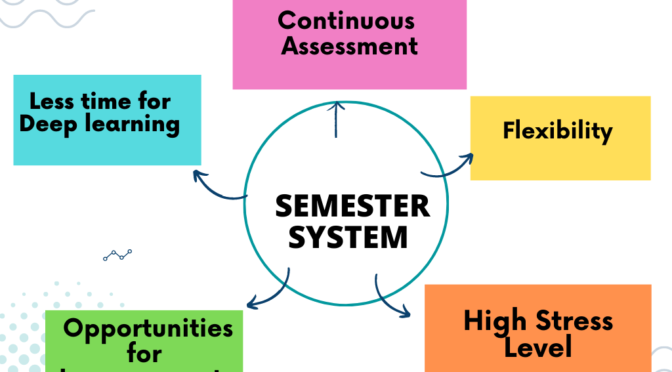The semester system is an academic calendar system that divides the academic year into two or three semesters, each of which typically lasts for 15-18 weeks. Here are some of the merits and demerits of the semester system:
Merits:
- Flexibility: The semester system provides greater flexibility for students in terms of course scheduling, allowing them to take a wider variety of courses and complete their degree requirements at their own pace.
- Continuous Assessment: The semester system provides regular opportunities for students to be assessed and evaluated through mid-term and end-of-semester exams, quizzes, and assignments. This helps to monitor student progress and provide timely feedback, which can be beneficial for students’ learning.
- Opportunities for Improvement: With regular assessments, students who don’t perform well in one semester have another opportunity to improve in the next semester, and the overall grades are averaged to calculate the final grade.
- Improved Faculty-Student Interaction: The semester system allows for more frequent interactions between students and faculty, which can lead to better communication and understanding.
- Improved Learning Outcomes: With regular assessments, students are more motivated to keep up with their studies and can be more actively engaged in their learning.
Demerits:
- High-stress levels: The semester system may increase the stress levels among students, due to the pressure of regular exams, deadlines and workload.
- Difficulties with transferring credits: Transferring credits between universities with different semester systems can be challenging, as the course content and duration may differ.
- Limited time for deep learning: With shorter semesters, students may not have sufficient time to fully understand and absorb complex concepts or to engage in deep learning.
- Limited opportunities for remedial classes: With limited time and a packed curriculum, there may be limited opportunities for students to attend remedial classes, which can be disadvantageous for students who struggle with certain subjects.
- Difficulty in coordinating courses: Due to the number of courses offered, coordinating between different departments and courses can be challenging.
Also Read : Difference between Measurement and Evaluation

Also Visit : Prep with Harshita


I don’t think the title of your article matches the content lol. Just kidding, mainly because I had some doubts after reading the article.
Thanks for sharing. I read many of your blog posts, cool, your blog is very good.
I really believe that a property foreclosure can have a major effect on the borrower’s life. Mortgage foreclosures can have a Six to several years negative influence on a applicant’s credit report. A new borrower who has applied for home financing or virtually any loans for instance, knows that the worse credit rating is, the more tricky it is to have a decent mortgage. In addition, it can affect a new borrower’s power to find a really good place to lease or rent, if that results in being the alternative homes solution. Good blog post.